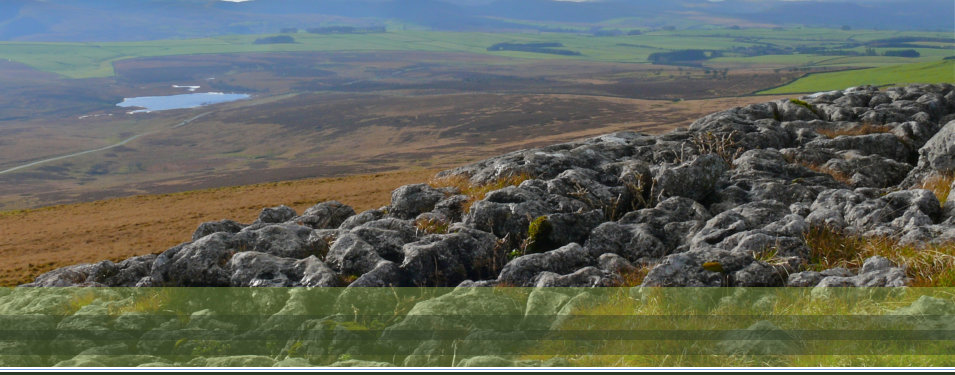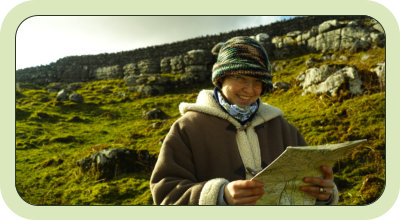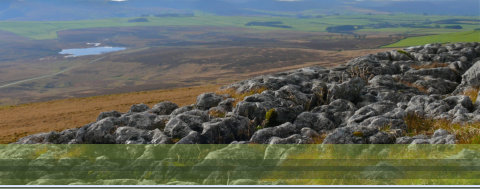
A Carboniferous Prehistory
The Carboniferous period lasted about 140 million years (roughly from 359 to 299 million years ago) during which time the sea levels rose and fell over this area in successive submersions leaving coal measure layers of deposits of limestone, sandstone, shale and coal. These limestone pavement rocks date from the Early Carboniferous (the Asbian Mississippian) period and have been used very effectively in dry-stone walls as field boundaries. Walkers should take care when traversing limestone pavement and be warned that the Clints (raised platforms) can be slippery when wet and have sharp edges and the grikes (gulleys) can be deep. The impressive limestone pavements dating from the Visean stage of the Middle Mississippian (early Carboniferous) were revealed by glacial action. Known as the Asbian formation, this hard marine sedimentary rock was formed from the calcareous shells and coral skeletons of ancient sea creatures and is thought to have been laid down over a period of 3.4 million years, from 339.4 to 336.0 million years ago in the sun-lit tropical tidal shallows of the Rheic Ocean. Picture these waters as home to corals, benthic molluscs and echinoderms. Sharks cruised the shallows to snap up boney fish (teleosts). The soft substrate was populated by burrowing shellfish, the harder sea bed likely supported the solitary and colonial corals and sponges. Fossilised remains can be photographed in the dry-stone walls, they are not particularly evident in the pavement itself. The pavement does harbour a highly specialist sub-arctic plant community. The grikes provide sheltered habitat for vestigial relict populations of woodland plants from prehistoric times before covering woodland was cleared. Click here for Limestone Landscapes Leaflet
Bring a friend


This pamphlet is an excellent guide from the
Limestone Pavement
Conservation Group.


Geology
Advertisement
Advertisement
© This site and its contents are copyright 2010-22 by C.Paxton and other contributing members of the Westmorland Fells Group.


Geology

Celebrating Cumbria’s Carboniferous Fells and Dales
Geology
A Carboniferous Prehistory
The Carboniferous period lasted about 140 million years (roughly from 359 to 299 million years ago) during which time the sea levels rose and fell over this area in successive submersions leaving coal measure layers of deposits of limestone, sandstone, shale and coal. These limestone pavement rocks date from the Early Carboniferous (the Asbian Mississippian) period and have been used very effectively in dry-stone walls as field boundaries. Walkers should take care when traversing limestone pavement and be warned that the Clints (raised platforms) can be slippery when wet and have sharp edges and the grikes (gulleys) can be deep. The impressive limestone pavements dating from the Visean stage of the Middle Mississippian (early Carboniferous) were revealed by glacial action. Known as the Asbian formation, this hard marine sedimentary rock was formed from the calcareous shells and coral skeletons of ancient sea creatures and is thought to have been laid down over a period of 3.4 million years, from 339.4 to 336.0 million years ago in the sun-lit tropical tidal shallows of the Rheic Ocean. Picture these waters as home to corals, benthic molluscs and echinoderms. Sharks cruised the shallows to snap up boney fish (teleosts). The soft substrate was populated by burrowing shellfish, the harder sea bed likely supported the solitary and colonial corals and sponges. Fossilised remains can be photographed in the dry-stone walls, they are not particularly evident in the pavement itself. The pavement does harbour a highly specialist sub- arctic plant community. The grikes provide sheltered habitat for vestigial relict populations of woodland plants from prehistoric times before covering woodland was cleared. Click here for Limestone Landscapes Leaflet



This pamphlet is an excellent guide from the
Limestone Pavement
Conservation Group.

Advertisement
Advertisement
© This site and its contents are copyright 2010-22 by C.Paxton and
other contributing members of the Westmorland Fells Group.






















